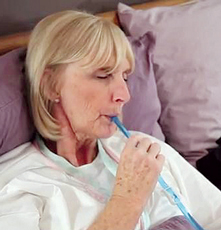
Despite dozens of studies on dehydration in the elderly, little research offers conclusive advice on how to solve the problem. A new device hopes to help by using a system that sprays high volumes of fluid into the mouth.
“Quick readmission from a nursing facility back to a hospital triggers negative Medicare and insurance reactions as well as negative ratings for the nursing facility,” and dehydration is a chief reason, said Steven Hodes, M.D., a gastroenterologist and medical consultant for OGWA. Stroke and heart attack risks increase with dehydration, and cognitive function can diminish.
OGWA Corp.’s pressurized fluid reservoir has a leak-proof valve, and two chambers have fluid and pressurized air created through a pump. A 100-ounce bladder provides “spray to drink convenience” while a partition keeps it from ballooning out of shape, said OGWA Chief Executive Harlan Gardiner.
The device may help elderly residents who need hydration, the company noted, especially for those too weak to pick up cups or suck on straws. The fluid amount won’t induce aspiration and can both save nurses’ time with the resident and lessen frustration. Hodes, who works in two medical centers in New Jersey, says there is no gravity pole and no spoon-feeding, which residents appreciate. He says using OGWA could potentially have a positive influence on a facility’s rating when surveyors visit.
“Clinical, significant dehydration is an enormous problem for the elderly, whether they are admitted from a hospital or private home,” Hodes said. Elderly residents are often not capable of registering thirst or are too weak to lift drinking vessels.
“They often spill cups or plastic pitchers,” he explained. Nurses need colleagues simply to help maintain hydration, especially if multiple pills are involved.
From the June 05, 2015 Issue of McKnight's Long-Term Care News




